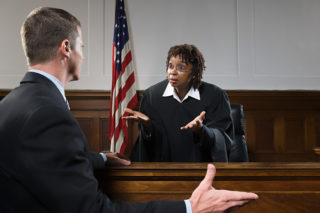California Motion to Compel Discovery is Continuing
Does the 45-Day Rule Apply when no Privilege Log was Served?

Recently I was contacted by an attorney who asked
"When does the 45 days to bring a motion to compel further responses to RPD begin? Is it when they serve their written response with an asserted privilege, or when they produce documents? The issue is over an asserted attorney client privilege. They produced redacted documents, no privilege log yet."
Continue Reading Does the 45-Day Rule Apply when no Privilege Log was Served?
Why You Need to Bring that Motion To Compel Further Responses to Interrogatories

The purpose of discovery is to take the "game" element out of trial preparation by enabling the parties to obtain evidence necessary to evaluate and resolve their dispute before a trial is necessary. Weil and Brown, Cal. Prac. Guide: Civil Procedure Before Trial (TRG 2018) ¶8:1 citing Greyhound Corp. v. Superior Court (1961) 55 C.2d. 355, 376.
Serving "[a]ppropriate written interrogatories are one of the means to accomplish the general goals of the discovery process designed to facilitate a fair trial." (Juarez v. Boy Scouts of America, Inc. (2000) 81 CA4th 377, 389)
"Interrogatories expedite the resolution of lawsuits … [by detecting] sham claims and defenses … [and] may be employed to support a motion for summary judgment or a motion to specify those issues which are without substantial controversy." Deyo v. Kilbourne (1978) 84 CA3d 771, 779
Continue Reading Why You Need to Bring that Motion To Compel Further Responses to Interrogatories
How a Crafty Lawyer Hides Things by Avoiding the Details when Responding to Requests for Production of Documents

Most cases rise and fall on whether there is documentary evidence supporting a claim or defense. Thus, the most important discovery device in a litigator's toolbox is the ability to request documents pursuant to CCP 2031.210 et seq. Unfortunately, most lawyers fail to properly respond and produce documents which leads to the ever so popular Motion to Compel Further Responses and Production of Documents
Patrick Nolan's article " How the crafty defense lawyer hides things by avoiding the details in requests for production of documents — Using the teeth of the statute to get the most out of RFPs" gives an eye opening tutorial on how to deal with a response that is not as straightforward as it appears. Below is his article.
Continue Reading How a Crafty Lawyer Hides Things by Avoiding the Details when Responding to Requests for Production of Documents
Should you withdraw your motion if the other side has complied?

I have always been a strong advocate that you should be awarded sanctions if you had to bring a motion to get the relief you were entitled to even if the other side complied prior to the hearing on the motion. However in the case of Evilsizor v. Sweeney (2014) 230 CA4th 1304, the First District Court of Appeal had an interesting take on the issue.
Continue Reading Should you withdraw your motion if the other side has complied?
Acted with Substantial Justification
Just wondering, but what does the phrase "acted with substantial justification" mean in the sanctions statute for motion to compel depo testimony, CCP 2025.480 (pdf)?
Does it mean the conduct that led the moving party to make the motion has to be substantially justified? Or does it mean the decision to make or oppose the motion to compel has to be substantially justified?
Continue Reading Acted with Substantial Justification
All Answers Remain the Same

DILEMMA: It is 30 days before trial and you get the final responses to your propounded discovery. In reviewing responding party's answers to supplemental interrogatories the verified response says "Responding party states that all answers to Interrogatories, Set No. One, that were previously served in this action remain the same." Yet years have passed, records have been obtained, experts have been deposed and you know they're lying. What do you do?
Continue Reading All Answers Remain the Same
The Document from Hell–aka The "Privilege Log"
In responding to Requests for Production of documents you have three response choices (1) agree to produce (C.C.P. §2031.220); (2) state that after a diligent search and a reasonable inquiry you have no documents (C.C.P. §2031.230) or (3) object (C.C.P. §2031.240). If you chose option three, then you must prepare a privilege log. Although C.C.P. §2031.240(b) does specifically not state the kind of identification that is required, it is expected that for each document withheld that the privilege log state (a) the nature of the document (e.g., letter, memorandum, (b) date, (c) author, (d) recipients, (e) the sequential number (or document control umber, if any), and (f) the privilege claimed. See California Civil Discovery Practice (CEB 4th Ed. 2011) §3.192 citing Wells Fargo Bank v. Superior Court (2000) 22 C4th 201 and §33.201for a sample of a privilege log.
Continue Reading The Document from Hell–aka The "Privilege Log"
GAME ON-The Opposition
You have been served with the Motion to Compel Further Responses with a Separate Statement of Items in Dispute the size of your fist and your response is due in two weeks. Now what do you do? First, take a deep breath. This is the time you decide when to "hold them and when to fold them" because how you respond may end up setting the tone between you and opposing counsel for the entire case.
Continue Reading GAME ON-The Opposition
What Should Your Discovery Motions Look Like?
Discovery motions are the banes of most attorneys' existence and they are often relegated to the newbie in the office to prepare. Young associates as well as other attorneys struggle on what needs to be in the papers and exactly how to convince the court that they should win.
With the courts' having budgetary problems and staff shortages, it is in your best interests to make it real clear to the court (1) what has happened; (2) what you want the court to do; and (3) why you are entitled to the discovery and sanctions in a succinct fashion.
Continue Reading What Should Your Discovery Motions Look Like?
You've Blown the Dreaded Draconian 45-Day Rule-Now What Do You Do?
Motions to compel further responses to interrogatories, requests for productions of documents and requests for admissions require that the motion be filed within 45 days. CCP §§ 2030.300(c), 2031.310(c) and 2032.290(c) Delaying the filing of the motion waives a party's right to compel further responses. The case of Vidal Sassoon, Inc. v. Superior Court (1983) 147 Cal. App. 3d 681 at 685 (Pre-1986 Discovery Act) takes the position that the court lacks jurisdiction to order further responses after time has expired. The Second District Court of Appeal upheld this rationale in Sexton v. Superior Court (1987) 58 Cal. App. 4th 1403), 1410. So now what do you do?
Continue Reading You've Blown the Dreaded Draconian 45-Day Rule-Now What Do You Do?
Source: https://www.resolvingdiscoverydisputes.com/category/request-for-production-of-documents/document-production-motion-to-compel/
0 Response to "California Motion to Compel Discovery is Continuing"
Post a Comment